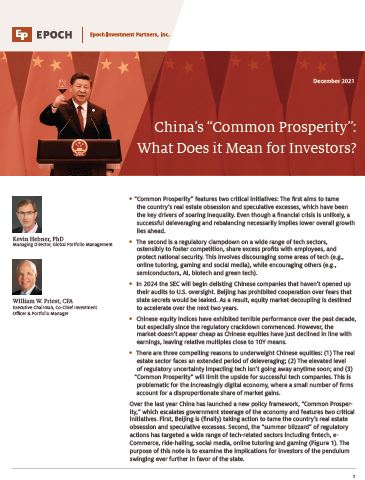by Kevin Hebner, PhD Managing Director, Global Portfolio Management and William W. Priest, CFA Executive Chairman, Co-Chief Investment Officer & Portfolio Manager
• “Common Prosperity” features two critical initiatives: The first aims to tame the country’s real estate obsession and speculative excesses, which have been the key drivers of soaring inequality. Even though a financial crisis is unlikely, a successful deleveraging and rebalancing necessarily implies lower overall growth lies ahead.
• The second is a regulatory clampdown on a wide range of tech sectors, ostensibly to foster competition, share excess profits with employees, and protect national security. This involves discouraging some areas of tech (e.g., online tutoring, gaming and social media), while encouraging others (e.g., semiconductors, AI, biotech and green tech).
• In 2024 the SEC will begin delisting Chinese companies that haven’t opened up their audits to U.S. oversight. Beijing has prohibited cooperation over fears that state secrets would be leaked. As a result, equity market decoupling is destined to accelerate over the next two years.
• Chinese equity indices have exhibited terrible performance over the past decade, but especially since the regulatory crackdown commenced. However, the market doesn’t appear cheap as Chinese equities have just declined in line with earnings, leaving relative multiples close to 10Y means.
• There are three compelling reasons to underweight Chinese equities: (1) The real estate sector faces an extended period of deleveraging; (2) The elevated level of regulatory uncertainty impacting tech isn’t going away anytime soon; and (3) “Common Prosperity” will limit the upside for successful tech companies. This is problematic for the increasingly digital economy, where a small number of firms account for a disproportionate share of market gains.
